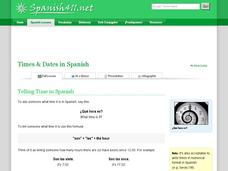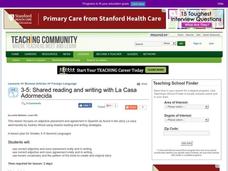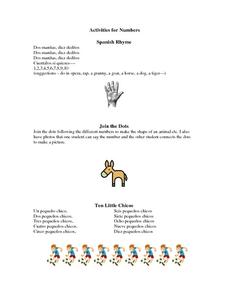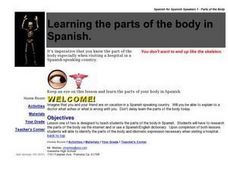Curated OER
Spanish Diminutives, Augmentatives, and More…
Teach your kiddies how to create diminutives and augmentatives in Spanish. They'll soon be adding -ito and -ita to every noun they can! Diminutives and augmentatives are much more common in Spanish, so there are many examples included...
Curated OER
Times & Dates in Spanish
Use this information, presentation, and infographic to build several lessons on telling the time and expressing the date in Spanish. The information is broken into topics and includes many examples and exceptions to the standard rules....
Curated OER
Negative Words & Expressions in Spanish
You don't never use double negatives in English, but the grammar is slightly different in Spanish. Help your class grasp this concepts and pick up how to compose sentences that are negative, rather than affirmative with the information...
Curated OER
Spanish Prepositional Pronouns
There are many different types of pronouns used in Spanish for various purposes. If your class has mastered subject pronouns, object pronouns, and reflexive pronouns, perhaps they are ready to learn about prepositional pronouns. You can...
Curated OER
Online Spanish Lesson on Superlatives: General Rules
How much does your class know about superlatives? Inform them of the basics and provide some practice with the information here. You can use the examples to help teach the concepts in class or send learners to this page at home. The...
Look! We're Learning!
La Comida!
What would you like to eat? Perhaps una hamburguesa? Teach your class eight Spanish words that relate to food with these cards.
Curated OER
Shared Reading and Writing with La Casa Adormecida
Write a book using Spanish vocabulary after listening to the book La Casa Adormecida. Learners identify known vocabulary, match vocabulary from the book with visuals, and unscramble syllables discover words. Students write a new version...
Spanish-4-You
Coloring Book for Kids in Spanish Lesson 1: Greetings
Introduce your class to basic salutations in Spanish and English with a group of activities and exercises. The materials, which can be put together as a packet, include coloring pages, a matching activity, a fill-in-the-blank exercise,...
Hello-Hello
Spanish – Learn Spanish (Hello-Hello)
Pick up basic conversational Spanish with animated videos featuring three characters: Pablo, Ana, and Marcos. As Pablo and Marcos get to know Ana, they talk about a variety of subjects. Learners can acquire the vocabulary in each...
Curated OER
Spanish Animal and Sounds
Students memorize the names of farm animals and the sound they make in Spanish. In this Spanish vocabulary lesson, students use total physical response, music and games to learn the names of nine farm animals and the sounds they make in...
GeorgiaStandards.org
Family and Friends
Build your own Spanish unit about family and friends with these assessments and activities! Included here are several summative assessments to choose from and many activity ideas, cross-curricular tasks, and formative assessments you can...
Curated OER
Immersion: Basic greetings
Hola, buenos dias! One method of language teaching requires the teacher to create an immersion classroom, meaning that no English is spoken. This plan shows how a teacher would go about modeling phrases to teach greetings and appropriate...
World History Digital Education Foundation, Inc.
COVID-19: Comparison with the Influenza Pandemic of 1918
A timely lesson uses documentation from the Spanish influenza pandemic of 1918 to compare it to the COVID-19 pandemic in 2020. Scholars watch a short video, analyze sources, complete a worksheet, and write a claim with supporting...
Curated OER
Inglés Básico: La Casa en Inglés
Your English language learners will like this interactice webpage that teaches house vocabulary! They'll hear an audio clip of each vocabulary term, match pictures to their correct English tranlsation, and determine where each item would...
Curated OER
Body Parts in Spanish
Students use Spanish to recognize and recall body parts. In this Spanish anatomy lesson, students identify and name the parts of the body in Spanish. Students describe a person physically by his hair and color of eyes. Students graph...
Curated OER
Spanish Made Easy
Students participate in different activities to practice Spanish words and phrases. They discover how to speak different verbs, days of the week and numbers. They finally participate in dialogs in formal Spanish.
Curated OER
Spanish Days of the Week/Counting
Students practice using the Spanish words for the days of the week and numbers. They use a calendar to help them with the activity. They also demonstrate their ability to say "tomorrow will be" and "yesterday was".
Curated OER
Poems and Translation (from Spanish to English)
Students read and are read various poems in their native language of Spanish. In groups or individually, they translate the poems into English and practice speaking English by reading them to the class. They answer comprehension...
Nebraska Department of Education
Activities for Numbers
Looking for ideas for teaching numbers to your Spanish class? Try out one or all of these 16 activity ideas!
Curated OER
Adapting Narratives for Skits to Teach Language Through Drama
Students in a Spanish foreign language class are giving topics to develop a skit to preform in front of the class. As a class, they are introduced to new vocabulary and the concept of paraphrasing. After performing their skit, they...
Curated OER
Counting in Espanol
Young scholars create a mini-book with the Spanish numbers 0-10, then compare and contrast the English numbers to the new Spanish numbers.
Curated OER
Spanish Mat Game
Students demonstrate their knowledge of Spanish numbers while using various locomotor movements in a physical education game.
Curated OER
Learning the Parts of the Body in Spanish
Students use the Internet or Spanish dictionary to find the Spanish words for the names of the parts of the body. They examine expressions needed in case they would get hurt and needed to go to the hospital.
Curated OER
Likes and Dislikes
Students recognize and use the vocabulary associated with vacationing at the beach and, while playing a bean-bag toss game, express likes and dislikes in first, second, and third person conjugations (Spanish exercise).

























